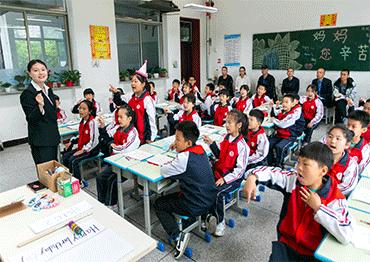As more schools inundate their already overworked teachers with extra duties to curry favor with local officials, educators and lawmakers are rallying to reduce their workload and return their focus to core education
“ We are trapped in a cage. The cage is gradually shrinking, and we are working every day as if on our last breath.”
These words are from the suicide note of an elementary school teacher surnamed Lü, who jumped to her death from the sixth floor of her apartment building in Zhengzhou, Henan Province on October 26, 2023.
The 23-year-old had only been hired to teach the third grade at Jianxing Road Elementary School two months before her tragic death, her sister told media.
According to the note released by her sister, Lü was feeling increasingly overwhelmed by the additional duties, activities and teacher evaluations imposed by administrators and school officials.
“When do teachers ever get to focus on teaching? How can an unhappy teacher cultivate happy children?” read a screenshot of Lü’s suicide note.
The news sparked a new round of heated discussions about the growing workloads of China’s teachers, which range from administrative tasks assigned from local government departments and conducting open classes for observation, to handwritten lesson plans and frequent teacher evaluations.
The issue was highlighted during this year’s two sessions, China’s annual legislative meetings held every March, when it was included in the government work report for the first time.
“Some teachers told me that evaluations are getting increasingly detailed and stricter, and standards have become more and more miscellaneous,” Chen Guiyun, a member of the Chinese People’s Political Consultative Conference (CPPCC) and the China Association for Promoting Democracy, told media during the sessions.
Teachers in many regions are even tasked with patrolling residential communities and local riverbanks during school vacations to ensure their students’ safety outside the classroom, Wang Chunxiu, a CPPCC member and former deputy director of the Ningxia Hui Autonomous Region education bureau, told NewsChina.
“Teachers now have to participate in all sorts of jobs unrelated to education, such as promoting tourism, public awareness campaigns and city beautification. This not only takes time away from regular teaching duties, but also increases their workloads,” Wang said.
Task Masters
Interviewed teachers told NewsChina that their extra workload is no more than enforced formalism.
Lü Ming, a biology teacher at a middle school in northern China, said that his school requires teachers to write out their lesson plans by hand, which takes up tremendous amounts of time.
“To tell you the truth, administrators just stamp the handwritten plans without even looking at them... I don’t understand why our school is so behind the times when technology is advancing every year and other fields are going paperless,” he told NewsChina.
At her middle school in Henan Province, teacher Bai Ling said she must prepare four lesson plan reviews every semester. She also must keep handwritten records about her classes and students’ homework, which she squeezes in during meetings or while giving an exam.
“What’s the meaning of that work? I’d rather spend the time preparing my classes,” she said.
Another headache for teachers is the numerous evaluations and class observations by education officials.
“Our school has made preparing for inspections a high priority,” Zheng Lin, a Chinese language teacher at a middle school in Fuzhou, Fujian Province, told NewsChina.
Zheng was often tasked with taking minutes during meetings and interfacing with the inspection teams that visited his school two to three times a week. “To meet with inspectors, the school sometimes even demanded that I suspend my routine classes,” Zheng said. “Teachers should focus on teaching, but now I feel like I’m ignoring my real job. Teaching has turned into something unimportant,” he added.
According to Zheng, a teacher at his school complained about the frequent addition of custodial work to pass inspections, but the administrator said they had no choice, because other schools have to do the same.
“Worse, some of the criteria is unreasonable. For example, they require that teachers do not keep anything on their desks, such as students’ exercise books,” Zheng said.
But Zheng said he feels that the constant flood of extra tasks assigned through apps like WeChat by school administrators are the most invasive.
“Every time I check my WeChat after class, there are several hundred new messages, and most of them are about trivial things... It’s like an alarm clock without an off button,” Zheng said.
“Although these duties are not compulsory, school administrators chastise you for not being proactive if you don’t do them enough,” he added.
Following Lü’s suicide, education expert Li Zhenxi told magazine Sanlian Life Week that complaints have been growing since 2010 as schools began assigning teachers extra duties to gain favorable appraisals from local officials. These often include tasks that reduce the officials’ own workloads, such as public awareness campaigns.
In 2017, Li conducted a survey on Sina Weibo that showed half of the 2,787 teachers who responded said they must prepare their lessons at home because they are busy with tasks unrelated to teaching while at school.
“Inefficient and unnecessary training and activities, unnecessary appraisals and reports, administrative forms and documents, formalistic evaluations, too many meetings and speeches... should be regarded as formalistic work unrelated to teaching,” Wang told NewsChina.

Teachers from Yu County, Shanxi Province observe a class in a middle school in Yuncheng, another city in the province, May 10, 2023 (Photo by VCG)
‘Many of Us Can’t Swim’
According to Dong Hui, an education management professor at East China Normal University, this added workload also comes directly from local government departments, which regard schools and teachers as a resource to promote and implement social affairs.
“Some teachers are tasked with other jobs, which blurs the boundaries of schools,” Dong said.
For example, many teachers are asked to promote safety rules among students and their parents, such as wearing a helmet when riding a moped and not riding unregistered motorcycles.
Liu Yang, a 32-year-old teacher at an elementary school in East China, told Dong that they were also asked to do street sanitation work, such as remove flyers and pick up trash, to prepare for official city inspections. She said that much of her time was spent on office work and dealing with parents and relevant departments. Failing to do so resulted in criticism from the school.
Teacher Bai Ling told NewsChina that she is also responsible for collecting information about poverty alleviation and urging students’ families to pay their social insurance on time.
To prevent students from drowning, Bai’s school arranges for teachers to patrol local rivers every day during school holidays. “But it’s beyond our abilities as many of us can’t swim,” Bai said.
“Teachers must register people for and promote vaccinations, physical exams and disease screening, as well as raise awareness about anti-fraud campaigns and laws,” Li Jun, an elementary school teacher in Shenzhen, Guangdong Province told NewsChina. “But that work actually requires expertise not every teacher has. Meanwhile, many parents are not willing to cooperate. Some even complain to the school, which then blames teachers for not communicating well,” he added.
Beyond reprimand, any refusal to do such work can hurt their careers in the long run, teachers told NewsChina.
“Teachers are often forced to take on work from local government departments, which generally have a great say in the schools’ appraisals and teachers’ career development,” Wang said.
“For the sake of career development, most young teachers would accept the assignments from officials, but some more experienced teachers may refuse,” Chu Zhaohui, a researcher at the China National Academy of Educational Sciences, told NewsChina. “But when those who take on the work reap the benefits and those who refuse are marginalized, school administration may negatively impact the careers of otherwise deserving teachers,” he warned.
Setting Limits
These increased workloads have raised concerns from the central government for several years. In 2018, then education minister Chen Baosheng publicly pledged to give time back to teachers. The following year at a national education work meeting, Chen vowed to reduce teachers’ workloads, allowing them to focus on teaching and improving their skillsets. The same year, the State Council, China’s cabinet, issued a directive on reducing teachers’ workloads, urging local governments and departments to standardize and simplify teacher exams and evaluations, while also limiting teachers’ involvement in social campaigns. Subsequently, some local governments rolled out their own measures to alleviate teachers’ workloads.
Despite these efforts, Wang Chunxiu noted that the measures and policies were not well implemented.
In 2023, the Beijing-based paper Guangming Daily and the China National Academy of Educational Sciences conducted a joint investigation into teachers’ work unrelated to teaching. The survey showed that 92.1 percent of respondents worked more than nine-hour days, with 32.5 percent reporting working more than 11 hours daily. Additionally, 60.8 percent of respondents stated that their nonteaching tasks were either “increasing” or “significantly increasing.”
The Guangming Daily attributed the mounting burden to society’s heightened expectations of teachers in the digital age, where apps keep them on call round the clock and their online duties include multiple roles beyond traditional education.
In a November 2023 commentary, the same paper urged authorities to outline a list of measures to reduce teachers’ workloads while advocating for strengthened supervision and an enhanced accountability system to ensure its implementation.
This call for action was supported by Party publication People’s Daily, which in February blamed formalism for hindering the implementation of workload reduction initiatives.
In another commentary, the paper called for an improved supervision system and suggested clarifying the respective responsibilities of schools and government departments. It also recommended a more scientific assessment of teachers, focusing on teaching quality and professional knowledge.
“Enabling teachers to concentrate on teaching and cultivating ethical people not only aligns with the fundamental principles of education but also meet the evolving needs of the education sector,” the commentary read.

 Old Version
Old Version
